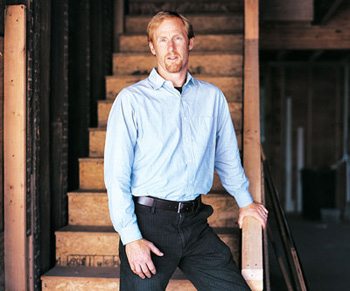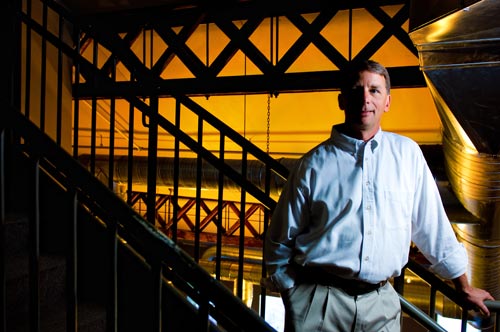 When the nationwide demand for LEED (Leadership in Energy and Environmental Design) certification swelled among developers, architects and property owners last year, the U.S. Green Building Council had that kind of good problem sustainability advocates had long hoped for. It also created a logistical nightmare–a significant backlog of 750 active projects requesting LEED certification–that stretched the process from five weeks to five months for many.
When the nationwide demand for LEED (Leadership in Energy and Environmental Design) certification swelled among developers, architects and property owners last year, the U.S. Green Building Council had that kind of good problem sustainability advocates had long hoped for. It also created a logistical nightmare–a significant backlog of 750 active projects requesting LEED certification–that stretched the process from five weeks to five months for many.
The USGBC’s solution was to outsource the process to the Green Building Certification Institute, which was responsible for 10 independent companies that would interpret and apply LEED credits to the growing number of projects seeking certification. The use of third-party certification, however, did not last long, because of a lack of consistency and clarity among the independent companies.
 Green, as we now know it, isn’t going away, and neither is America’s penchant for labels and marketing. The erstwhile Energy Star label now appears on 11,000 products in 38 categories. According to market researcher Mintel, 80 percent of Americans buy green products at least some of the time. But how do we avoid the dreaded specter of greenwashing, the disingenuous spinning of products or companies as environmentally friendly?
Green, as we now know it, isn’t going away, and neither is America’s penchant for labels and marketing. The erstwhile Energy Star label now appears on 11,000 products in 38 categories. According to market researcher Mintel, 80 percent of Americans buy green products at least some of the time. But how do we avoid the dreaded specter of greenwashing, the disingenuous spinning of products or companies as environmentally friendly?
Transparency is the key, says the leaders of third-party green certification outfits in PA who are doing more than just promoting the quality and accuracy of their own label. They’re setting a new standard that is benefitting others.
“The birth of our idea was simple. Just like a lot of people, we were sitting there kind of overwhelmed with the hundreds of different certifications that were out there and it became difficult to know what’s a good company or if someone’s just doing a really good job of marketing themselves,” Chester County-based B Labs co-founder Jay Coen Gilbert says. His non-profit company’s nationwide B Corporation community has grown to 325 companies certified as environmentally and socially responsible in three years, certifying twice as many B-Corps in the first six months this year than during the same period in 2009.
When Montgomery County-based sustainable design and development firm Sustainable Solutions Corporation started digging into products that already had third-party certification for its clients in the building trades, it discovered many errors. Wood-based products claiming to be 100 percent recycled content, for example, had some glue and binders in it that made it only 80 percent recycled content. Many of the existing certification bodies simply offered companies checklists to fill out. Technical, detailed studies were often not happening because marketers or non-technical types were leading the process. That led the company to spin off GreenCircle as its product certification unit.
 “We’re engineers and scientists here and really delve into how a product is made,” says Tad Radzinski, who co-founder and president of SSC. He also served as a national waste minimization expert for the Environmental Protection Agency for 10 years before leaving in 2007. “You need that to do analysis, and we feel we developed a robust and transparent system so we’re confident that what we say is correct.”
“We’re engineers and scientists here and really delve into how a product is made,” says Tad Radzinski, who co-founder and president of SSC. He also served as a national waste minimization expert for the Environmental Protection Agency for 10 years before leaving in 2007. “You need that to do analysis, and we feel we developed a robust and transparent system so we’re confident that what we say is correct.”
Both SSC and GreenCircle practice what they certify. They’re housed on a Royersford brownfield site in a nearly 150 year-old building along the Schuylkill River that started as a stove factory. Everything from the furniture to toilets is green.
That’s something that a company like CertainTeed can appreciate, and shoot for. The century-old building materials manufacturer headquartered in Valley Forge has had sustainability related initiatives for years, but there was a larger theme at play, says CertainTeed’s director of innovation and product sustainability, Aman Desouza.
“We wanted to connect innovation to sustainability,” he says, a nod to the title he has held for two years. “Not only were we looking at the ways we currently do things and making them more sustainable, but we wanted to shift the direction of our portfolio toward products designed with sustainability in mind.
“We see a huge opportunity for us to have an impact on sustainability of building stock around the world, be it through renovations or new construction.”
When it was time for the company to communicate the sustainable quality of its products, it reached out to GreenCircle for third-party certification.
“They’re probably far more rigorous than some of the larger brands we know,” says Desouza. “Yet they’re a smaller local company that we can work faster with. So we can actually spend more of our time and energy on raising the bar on our products than figuring out where that bar is.”
Based on its certifications, including several by GreenCircle, Desouza and CertainTeed now have a robust online road map called Building Responsibly, through which customers learn how the company’s building materials rank by category and how many LEED points they offer.
“It’s important to have a (certification) partner that maintains both the rigor and independence of the process, but at the same time remains a partner that can help you,” says Desouza.
Cynthia Gale, the principal at Pottstown sustainable branding/marketing shop BarberGale, long looked for such a partner. In B Labs, she found one that could help her and her clients be easily understood on the sustainability scale (BarberGale is now a B Corporation). The non-profit’s impact ratings system is geared to determine an applicant’s triple bottom line (people, planet, profit). Sometimes, Gale says, companies don’t even realize they’re already doing some pretty positive things.
“There are a lot of things, when you start adding them together, that allow you to tell a pretty good sustainability story, but it’s got to be solid and truthful,” she says. “It’s about taking lots of small steps and then reporting on it. It’s important to put that stake in the ground.”
B-Labs is definitely helping companies do that, especially in PA, which comprises more than 15 percent of the B-Corporation community. That community adheres to B Labs’ Declaration of Interdependence, and what’s more, provides a directory for consumers and investors interested in dealing with such environmentally and socially responsible companies.
The other big piece to B Labs is its public policy advocacy. Gilbert and company were instrumental in Philadelphia becoming the first city in the country to enact a tax credit for sustainable businesses. B Labs also helped Maryland and Vermont become the first states to adopt legislation to create a new class of benefit corporations, hailed as a major milestone for the sustainability movement. PA, Gilbert says, could be the first large state to follow suit with bipartisan-sponsored legislation headed to Harrisburg later this year.
“We use the power of business to solve problems,” says Gilbert, who co-founded sneaker giant AND1. “Certifications and ratings have been around a long time. We’re taking a tried and true practice that people are quite familiar with and applying it to a new field.”
GreenCircle evaluates an organization’s product, process or operation and offers certifications in the seven areas: recycled content, rapidly renewable resource content, closed loop production, sustainable manufacturing practices, life cycle assessment optimized, carbon footprint reduction, and renewable energy use. Radzinski says the Wal-Mart Sustainability Index, which the retail giant issued to all of its nearly 100,000 suppliers last year, should keep a steady stream of new customers seeking validation. Still, Radzinski is more focused on quality than quantity.
“I don’t think it’s an issue of the number of certifications we make, but the quality of those certifications, that will decide what will be the recognized standards,” he says.
Radzinski, though, finds himself with another one of those good problems. He’s finding it hard to find anyone with experience to fill new positions with his company. Radzinski, who helped Villanova University create its Master’s program in Sustainable Engineering and teaches a class there, thinks education is the key.
“Just about every major company now issues sustainability reports,” he says. “It’s a whole new way of thinking and it’s only a matter of time before that trickles down to smaller companies.”
Joe Petrucci is managing editor of Keystone Edge. Send feedback here.
To receive Keystone Edge free every week, click here
Photos:
GreenCircle’s Tad Radzinski, company co-founder and president overlooking the lobby of the Company’s headquarters which is located in a redeveloped brownfield site, an old stove factory from 1867.
(Jeff Fusco)
Radzinski (L) goes over conversion plans.
(Jeff Fusco)
Jay Coen Gilbert, co-founder of B Labs
Cynthia Gale of BarberGale Brand Development
